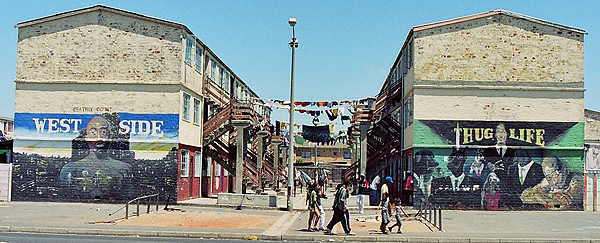Cape Town still a murder capital of the world
Despite Jo’burg’s reputation as the most dangerous city South Africa, it doesn’t make the shortlist list globally when it comes to murder. And while Cape Town is the gang capital of South Africa, this may not be the main reason for the high homicide stats.
 Gang murals in Manenberg, Cape Town
Gang murals in Manenberg, Cape Town
In the UN’s most recent Global Study on Homicide, Cape Town retains a position as one of the murder capitals of the world.
Local reports have repeatedly noted the high number of murders in Cape Town, despite Jo’burg’s reputation for violent crime. In 2006, a city of Cape Town report noted an average of five murders a day.
Murder rates have steadily declined since 2006, but the city still has a much higher rate than Jo’burg or Durban.
Cape Town’s notoriety as a global homicide capital was made official after a 2012 study by Mexican NGO Securidad, Justicia y Paz, claimed that Cape Town ranked at number 34 worldwide. The NGO’s most recent report shows the city has climbed to number 20 worldwide.
Gangsterism in the Cape
Murder rates in the Cape are generally attributed to gang activity being much higher than in other areas, and gang violence is most prevalent in the Cape Flats. A 2013 Institute for Security Studies Africa report summarises:
“For years, Mitchells Plain experienced the highest violence and property crime rates in the country. With the recent surge in gang violence, Mitchells Plain and surrounding areas clearly require in-depth multi-disciplinary interventions.”
Despite these numbers, the murder capital of South Africa is Nyanga — an area not known for its gang violence. The city’s most notorious gangs live elsewhere. The Hard Livings are headquartered in Manenberg, the Americans in Lavender Hill and the Numbers gang in Pollsmoor prison.
As the ISS Africa report states,
“The Cape Town residential areas of Nyanga, Khayelitsha, Gugulethu and Harare remain the most murderous in the peninsula, according to an analysis that takes population size into account. These areas have experienced abnormally high murder rates for more than a decade.”
Nyanga: rooted in violence
Nyanga’s turbulent history maybe a factor in the area’s murder rate. Established as a housing area for migrant workers, it was later occupied by black South Africans forcibly removed from Cape Town’s northern suburbs in the 1950s.
Subjected to a series of raids and forced removals over the decades, Nyanga is still predominantly home to young black South Africans. Perhaps the great factor in the area’s homicide rate is the very high unemployment rate in Nyanga, which is currently at 45%. This is a little above Lavender Hill, and much higher than Mitchell’s Plain, Manenberg and Khayelitsha.
National homicide stats
According to the most recent UN report, murder decreased more than 50% between 1995 and 2011. However, in a political debate after Jacob Zuma’s 2014 State of the Nation address, the DA said the president’s claim that murder had decreased was false. Africa Check verified the DA’s claims, stating murder rates are down over the last five years, but increased from 2011 to 2013.

